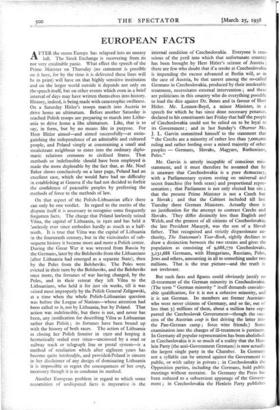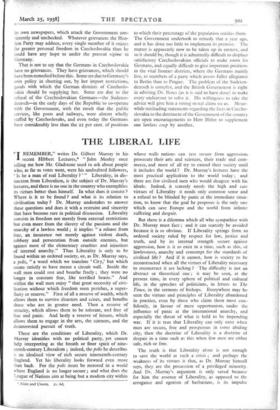EUROPEAN FACTS
AFTER the storm Europe has relapsed into an uneasy lull. The Stock Exchange is recovering from its not very creditable panic. What effect the speech of the Prime Minister on Thursday (no comment is possible on it here, for by the time it is delivered these lines will be in print) will have on that highly sensitive institution and on the larger world outside it depends not only on the speech itself; but on other events which even in a brief interval of days may have written thems elves into history. History, indeed, is being made with catastrophic swiftness. On a Saturday Hitler's troops march into Austria to drive home an ultimatum. Before another Saturday is reached Polish troops are preparing to march into Lithu- ania to drive home a hie ultimatum. Like, that is to say, in form, but by no means like in purpose. For Herr Hitler aimed—and aimed successfully—at extin- guishing the independence of an admirable and cultured people, and Poland simply at constraining a small• and recalcitrant neighbour to enter into the ordinary diplo- matic relations common to civilised States. That methods so indefensible should have been employed is made the more deplorable by the fact that, as Mr. Noel Baker shows conclusively on a later page, Poland had an excellent case, which she would have had no difficulty in establishing at Geneva if she had not decided to forfeit the confidence of peaceable peoples by preferring the methods of force to the methods of law.
On that aspect of the Polish-Lithuanian affair there can only be one verdict. In regard to the merits of the dispute itself it is necessary to recognise some frequently forgotten facts. The charge that Poland lawlessly seized Vilna, the capital of Lithuania, in 1920 and has held it !awlessly ever since embodies hardly as much as a half- truth. It is true that Vilna was the capital of Lithuania in the fourteenth century, but in the vicissitudes of sub- sequent history it became more and more a Polish centre. During the Great War it was wrested from Russia by the Germans, later by the Bolsheviks from the Lithuanians (after Lithuania had emerged as a separate State), then by the Poles from the Bolsheviks. The Poles were evicted in their turn by the Bolsheviks, and the Bolsheviks once more, the fortunes of war having changed, by the Poles, and in their retreat they left Vilna to the Lithuanians, who held it for just six weeks, till it was seized most improperly by the Polish General Zeligowski, at a time when the whole Polish-Lithuanian question was before the League of Nations—whose attention had been called to it, not by Lithuania, but by Poland. That action was indefensible, but there is not, and never has been, any justification for describing Vilna as Lithuanian rather than Polish ; its fortunes have been bound up with the history of both races. The action of Lithuania in closing her Polish frontier in 192o and keeping it hermetically sealed ever since—uncrossed by a road or railway track or telegraph line or postal system—is a method of retaliation which after eighteen years has become quite intolerable, and provided-Poland is sincere in her disclaimer of any design of dominating Lithuania it is impossible to regret the consequences of her coup, necessary though it is to condemn its method.
Another European problem in regard to which • some recognition of undisputed facts is imperative • is the internal condition of Czechoslovakia. Everyone is con- scious of the peril into which that unfortunate country has been brought by Herr Hitler's seizure of Austria ; there are few who doubt that if a stroke at Czechoslovakia is impending the excuse advanced at Berlin will, as in the case of Austria, be that unrest among the so-called Germans in Czechoslovakia, produced by their intolerable treatment, necessitates external intervention ; and there are politicians in this country who do everything possible to load the dice against Dr. Benes and in favour of Herr Hitler. Mr. Lennox-Boyd, a minor Minister, in a speech for which he has since done necessary penance, declared to his constituents last Friday that half the people of Czechoslovakia could not be relied on to be loyal to its Government ; and in last Sunday's Obser6er Mr. J. L. Garvin committed himself to the statement that " the Czechs are a minority of rather Iess than 7,000,000 ruling and rather lording over a mixed majority of other peoples — Germans, Slovaks, Magyars, Ruthenian s, Poles."
Mr. Garvin is utterly incapable of conscious mis- statement, and it must therefore be assumed that he is unaware that Czechoslovakia is a pure democracy, with a Parliamentary system resting on universal and secret franchise (for both sexes) and proportional repre- sentation ; that Parliament is not only elected but sits ; that the present Prime Minister is not a Czech but a Slovak ; and that the Cabinet included till last Tuesday three German Ministers. Actually there is no justification for the attempt to contrast Czechs and Slovaks. They differ distinctly less than English and Welsh, and the greatest of all citizens of CZechoslovakia, the late President Masaryk, was the son of • a Slovak father. That recognised and strictly dispassionate au- thority, The Statesman's Year-Book, rightly declines to draw a distinction between the two strains and gives the population as consisting of 9,688,770 Czechoslovaks, 3,231,688 Germans, with Hungarians, Russians, Poles, Jews and others, amounting in all to something under two millions. That is the true picture—and the truth is not irrelevant.
But such facts and figures could obviously justify no ill-treatment of the German minority in Czechoslovakia. (The term " German minority " itself demands consider- able qualification, for it is not a cohesive minority, and it is not German. Its members are former Austrians who were never citizens of Germany, and so far, out of less than 31 millions of them, about a million have sup- ported the Czechoslovak Government—though the suc- cess of the Austrian coup is fast driving the latter into the Pan-German camp ; force wins friends.) Some examination into the charges of ill-treatment is pertinent. In Germany all popular representation has been abolished: in Czechoslovakia it is so much of a reality that the Hen- lein Party (the anti-Government Germans) is now actually the largest single party in the Chamber. In Germany not a syllable can be uttered against the Government in public, or with safety in private ; in Czechoslovakia the Opposition parties, including the Germans, hold public meetings without restraint. In Germany the Press has been reduced to a subservient appanage of the Govern- ment ; in Czechoslovakia the Henlein Party publishes its own newspapers, which attack the Government con- sistently and unchecked. Whatever grievances the Hen- lein Party may adduce, every single member of it enjoys far greater personal freedom in Czechoslovakia than he could have any hope to under the present regime in Germany.
That is not to say that the Germans in Czechoslovakia have no grievances. They have grievances, which should have been remedied before this. Some are due to Germany's own policy in shutting out, by her import restrictions, goods with which the German districts of Czechoslo- vakia should be supplying her. Some are due to the refusal of the Czechoslovakian Germans—the Sudeten- deutsch—in the early days of the Republic to co-operate with the Government, with the result that the public services, like posts and railways, were almost wholly staffed by Czechoslovaks, and even today the Germans have considerably less than the 22 per cent. of positions to which their percentage of the population entitles them. The Government undertook to remedy that a year ago, and it has done too little to implement its promise. The matter is apparently now to be taken up in earnest, and so it should be, though it is admittedly difficult to displace satisfactory Czechoslovakian officials to make room for Germans, and equally difficult to give important positions in the vital frontier districts, where the Germans mainly live, to members of a party which avows fuller allegiance to Berlin than to Prague. The problem of the Sudeten- deutsch is complex, and the British Government is right in advising Dr. Benes (as it is said to have done) to make every endeavour to solve it. His willingness to take the advice will give him a strong moral claim on us. Mean- while misleading statements regarding the facts in Czecho- slovakia to the detriment of the Government of the country are open encouragements to Herr Hitler to supplement one lawless coup by another.











































































 Previous page
Previous page